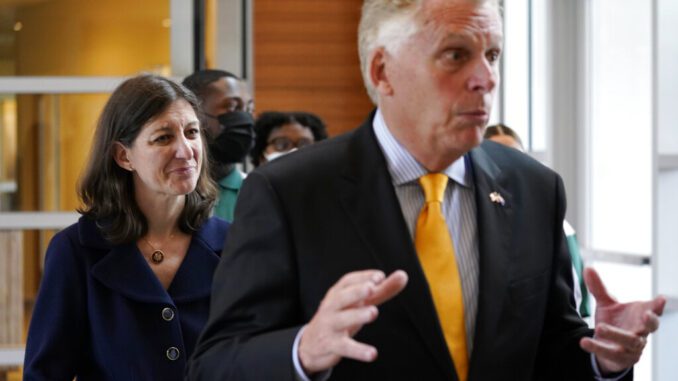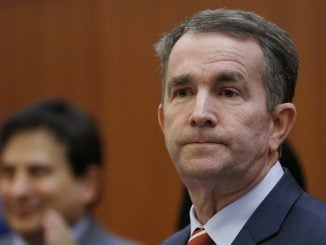
RICHMOND, Va. — Democrat Terry McAuliffe asked a court to dismiss a lawsuit filed by Virginia Republicans that seeks to remove him from the ballot in this year’s closely watched race for governor over an alleged paperwork error.
In a filing Friday evening, attorneys for the former governor now running for a second term against GOP nominee Glenn Youngkin said the suit was based on a “legal lie” and would effectively invalidate hundreds of thousands of votes cast in the Democratic primary.
The complaint filed earlier this week by the Republican Party of Virginia against state election officials argued that McAuliffe should be disqualified from running in the November general election because of the omission of his signature on an official form declaring his candidacy.
The formal “declaration of candidacy” McAuliffe submitted to the state’s board of elections to enter the Democratic primary in March is indeed missing his signature — the box he was supposed to sign was left blank, along with lines asking for his phone numbers —- though two witnesses’ signatures were included on the form. The suit also argues the witnesses violated state law because they could not have witnessed a signing that didn’t happen.
The Virginia Department of Elections declined to comment.
McAuliffe argued in his filing that nothing in Virginia code requires a candidate to sign the declaration of candidacy.
Further, the filing said: “Even if there were a technical defect with the declaration of candidacy — and there is not — it would provide no basis for removing McAuliffe’s name from the general election ballot and preventing Virginia’s voters from choosing him as their next Governor. The declaration of candidacy is a prerequisite for placement on the ballot in the primary election, not the general election, and the primary election has already concluded.”
McAuliffe handily defeated four challenges in the June Democratic primary. He captured about 62% of the vote and was the top vote-getter in every city and county in the commonwealth.
“There is no basis for the Republican Party to now — almost three months later — contest the results of another party’s primary,” his filing said.
Several state election law experts told The Associated Press on Thursday, when the suit was filed in Richmond Circuit Court, that they would be surprised if it succeeds. Online court records do not show that a hearing has been set.
McAuliffe, a longtime fixture of Democratic politics, previously served as governor from 2014 to 2018 but was prohibited by state law from seeking a consecutive term. He announced his candidacy in December after deciding in 2019 to forego a run for president.
Youngkin is a former co-CEO of a private equity firm and a political newcomer seeking to end Virginia Republicans’ more than decade-long losing streak in statewide races.
Christina Freundlich, a spokesperson for McAuliffe’s campaign, called the lawsuit a “Trumpian” effort to distort the law and the will of the voters.
“We haven’t even made it to Election Day and Virginia Republicans are already trying to undermine the election results in court using Donald Trump and Rudy Giuliani’s playbook,” she said in a statement.
In 2019, Nick Freitas, a member of the Virginia House of Delegates, was forced to run a write-in campaign after he was disqualified because of a paperwork snafu.
Virginia, the only state in the nation that does not allow its chief executive to serve consecutive terms, is also the only state with an open race for governor this year. The commonwealth’s unusual off-year elections routinely draw outsized national attention as a possible test of both parties’ strengths ahead of the midterms.
Rick Hasen, an election law expert who teaches at the University of California, Irvine, said that states have varying standards when it comes to enforcing election rules, with some states much more forgiving of “technical difficulties” than others.
But “as a general matter, it would be surprising to see a court knock a major candidate for office off the ballot for a technicality,” he said.
Third-party gubernatorial candidate Princess Blanding will also be on the ballot. Election Day is Nov. 2 and early voting begins Sept. 17.



